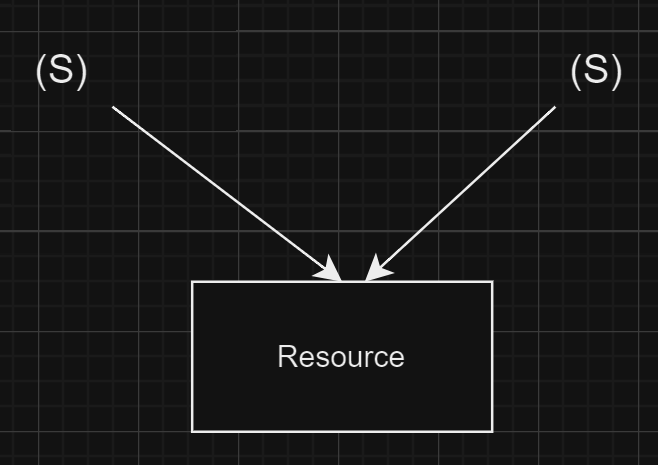26 Java - Multithreading 3 (Custom Locks)
 Chetan Datta
Chetan Datta
Monitor Lock
Locking do not depends on Object like synchronized method.
synchronized method puts the monitor lock on the object
synchronized {
...
..Critical Section..
...
}
Example (Synchronized)
public class SharedResource {
boolean isAvailable = false;
public synchronized void producer(){
try{
System.out.println("Lock acquired by: "+Thread.currentThread().getName());
isAvailable = true;
Thread.sleep(4000);
} catch (Exception e){
}
System.out.println("Lock release by: "+ Thread.currentThread().getName());
}
}
public class Main {
public static void main(String[] args) {
SharedResource resource1 = new SharedResource();
Thread th1 = new Thread(()->{
resource1.producer();
});
SharedResource resource2 = new SharedResource();
Thread th2 = new Thread(()->{
resource2.producer();
});
th1.start();
th2.start();
}
}
Lock acquired by: Thread-1
Lock acquired by: Thread-0
Lock release by: Thread-1
Lock release by: Thread-0
Here each thread can access the critical section because each object has separate critical section.
Only one thread should access the critcal section irrespective of objects.
Custom Locks
Reenrant
ReadWrite
Semaphore
Stamp
Reentrant Lock
public class SharedResource {
boolean isAvailable = false;
public void producer(ReentrantLock lock){
try{
lock.lock();
System.out.println("Lock acquired by: "+Thread.currentThread().getName());
isAvailable = true;
Thread.sleep(4000);
} catch (Exception e){
}
finally {
lock.unlock();
System.out.println("Lock release by: "+ Thread.currentThread().getName());
}
}
}
import java.util.concurrent.locks.ReentrantLock;
public class Main {
public static void main(String[] args) {
ReentrantLock lock = new ReentrantLock();
SharedResource resource1 = new SharedResource();
Thread th1 = new Thread(()->{
resource1.producer(lock);
});
SharedResource resource2 = new SharedResource();
Thread th2 = new Thread(()->{
resource2.producer(lock);
});
th1.start();
th2.start();
}
}
Lock acquired by: Thread-0
Lock release by: Thread-0
Lock acquired by: Thread-1
Lock release by: Thread-1
ReadWriteLock
Pessimistic Locks
ReadWriteLock implements the following 2 pessimistic locks:
Shared (S) Lock: Any number of threads can put a shared lock on a resource for read-only purposes. If one thread puts a shared lock on a resource, no other thread can put an exclusive lock on it until the shared lock is released.
Exclusive (X) Lock: This lock is used for writing purposes. If any thread puts an exclusive lock on a resource, no other thread can put either a shared or an exclusive lock on it until the exclusive lock is released.

| T2/T1 | S | X |
| S | Possible | Not Possible |
| X | Not Possible | Not Possible |
import java.util.concurrent.locks.ReadWriteLock;
import java.util.concurrent.locks.ReentrantLock;
public class SharedResource {
boolean isAvailable = false;
public void producer(ReadWriteLock lock){
try{
lock.readLock().lock();
System.out.println("Lock acquired by: "+Thread.currentThread().getName());
Thread.sleep(4000);
} catch (Exception e){
}
finally {
lock.readLock().unlock();
System.out.println("Lock release by: "+ Thread.currentThread().getName());
}
}
public void consumer(ReadWriteLock lock){
try{
lock.writeLock().lock();
System.out.println("Lock acquired by: "+Thread.currentThread().getName());
isAvailable = false;
Thread.sleep(4000);
} catch (Exception e){
}
finally {
lock.writeLock().unlock();
System.out.println("Lock release by: "+ Thread.currentThread().getName());
}
}
}
public class Main {
public static void main(String[] args) {
ReadWriteLock lock = new ReentrantReadWriteLock();
SharedResource resource1 = new SharedResource();
Thread th1 = new Thread(()->{
resource1.producer(lock);
});
SharedResource resource2 = new SharedResource();
Thread th2 = new Thread(()->{
resource2.producer(lock);
});
SharedResource resource3 = new SharedResource();
Thread th3 = new Thread(()->{
resource3.consumer(lock);
});
th1.start();
th2.start();
th3.start();
}
}
Lock acquired by: Thread-1
Lock release by: Thread-1
Lock acquired by: Thread-2
Lock acquired by: Thread-0
Lock release by: Thread-2
Lock release by: Thread-0
StampedLock
It provides 2 locks
Read/Write Lock
Optimistic Read
Locks are of 2 types
Pessimistic Locks: All locks like Shared (S) and Exclusive locks(X)
Optimistic Locks: There is no Lock acquired.
Stamped Read/Write Lock
- Support Read/Write Lock functionality like ReadWriteLock
import java.util.concurrent.locks.StampedLock;
public class SharedResource {
int a = 10;
StampedLock lock = new StampedLock();
public void producer(){
long stamp = lock.readLock();
try{
System.out.println("Read Lock acquired by: "+Thread.currentThread().getName());
a = 11;
Thread.sleep(6000);
}catch (Exception e){
}
finally {
lock.unlockRead(stamp);
System.out.println("Read Lock release by: "+ Thread.currentThread().getName());
}
}
public void consumer(){
long stamp = lock.writeLock();
System.out.println("write lock acquired by : "+ Thread.currentThread().getName());
try{
System.out.println("performing work");
a = 9;
}
finally {
lock.unlockWrite(stamp);
System.out.println("write lock released by : "+Thread.currentThread().getName());
}
}
}
public class Main {
public static void main(String[] args) {
SharedResource resource = new SharedResource();
Thread th1 = new Thread(()->{
resource.producer();
});
Thread th2 = new Thread(()->{
resource.producer();
});
Thread th3 = new Thread(()->{
resource.consumer();
});
th1.start();
th2.start();
}
}
Read Lock acquired by: Thread-1
Read Lock release by: Thread-1
Read Lock acquired by: Thread-0
Read Lock release by: Thread-0
Optimistic Read (Example)
Db snapshot
| Id | Name | Type | Row Version |
| 123 | SJ | Student | 1 |
| 456 | Ram | Student | 1 |
| Time\Thread | Thread1 | Thread2 | Rowversion | |
| Time 1 | Read(123) (Rowversion: 1) | Read(123) (Rowversion: 1) | 1 | |
| Time 2 | Perform some operation(:::); Update Type to Teacher | Perform some operation(:::); Update Type to Ex-Student | 1 | |
| Time 3 | update (123) type | 2 | update Table set Type='Ex-Student' where rowversion = 1 (Update successful, rowversion incremented) | |
| Time 4 | update(123) type | 2 | Rollback because the rowversion is 1 at the time of read. So update will not happen. Now do from the start (read again) | |
| Time 5 | Read(123) (Rowversion: 2) | 2 | ||
| Time 6 | Perform some operation(:::); Update Type to Teacher | 2 | update Table set Type='Teacher' where rowversion = 2 (Update successful, rowversion incremented) |
Optimistic Lock
- Support Optimistic Lock functionality too
import java.util.concurrent.locks.StampedLock;
public class SharedResource {
int a = 10;
StampedLock lock = new StampedLock();
//Here we applied optimistic read
public void producer(){
long stamp = lock.tryOptimisticRead();
try{
System.out.println("Taken optimistic read");
a = 11;
Thread.sleep(6000);
if (lock.validate(stamp)){
System.out.println("updated a value successfully");
}
else{
System.out.println("rollback of work");
a = 10; //rollback
}
}catch (Exception e){
}
}
public void consumer(){
long stamp = lock.writeLock();
System.out.println("write lock acquired by : "+ Thread.currentThread().getName());
try{
System.out.println("performing work");
a = 9;
}
finally {
lock.unlockWrite(stamp);
System.out.println("write lock released by : "+Thread.currentThread().getName());
}
}
}
public class Main {
public static void main(String[] args) {
SharedResource resource = new SharedResource();
Thread th1 = new Thread(()->{
resource.producer();
});
Thread th2 = new Thread(()->{
resource.consumer();
});
th1.start();
th2.start();
}
}
Taken optimistic read
write lock acquired by : Thread-1
performing work
write lock released by : Thread-1
rollback of work
If no thread 2 then optimistic
Taken optimistic read
updated a value successfully
Semaphore Lock
A semaphore can permit a fixed number of threads to execute the critical section simultaneously.
import java.util.concurrent.Semaphore;
public class SharedResource {
boolean isAvailable = false;
Semaphore lock = new Semaphore(2);
public void producer(){
try{
lock.acquire();
System.out.println("Lock acquired by: "+Thread.currentThread().getName());
isAvailable = true;
Thread.sleep(4000);
}
catch (Exception e){
}
finally {
lock.release();
System.out.println("Lock release by: "+ Thread.currentThread().getName());
}
}
}
public class Main {
public static void main(String[] args) {
SharedResource resource = new SharedResource();
Thread th1 = new Thread(()->{
resource.producer();
});
Thread th2 = new Thread(()->{
resource.producer();
});
Thread th3 = new Thread(()->{
resource.producer();
});
Thread th4 = new Thread(()->{
resource.producer();
});
th1.start();
th2.start();
th3.start();
th4.start();
}
}
Lock acquired by: Thread-1
Lock acquired by: Thread-0
Lock release by: Thread-1
Lock release by: Thread-0
Lock acquired by: Thread-2
Lock acquired by: Thread-3
Lock release by: Thread-2
Lock release by: Thread-3
Applications of Semaphore:
Printers: If you have 2 printers, then only 2 processes can use them at a time.
Connection Pool: If the connection pool has a size of 5, then a maximum of 5 threads can connect to it at the same time.
Condition (await & Signal)
Inter-thread communication
- The
synchronizedkeyword maintains monitor locks, and it also useswait()andnotify()methods to facilitate communication between threads.
The following communications in custom locks are equivalent to those in synchronized communications.
await() = wait()
signal() = notify()
public class SharedResource {
boolean isAvailable = false;
ReentrantLock lock = new ReentrantLock();
Condition condition = lock.newCondition();
public void producer(){
try{
lock.lock();
System.out.println("Produce lock acquired by: "+Thread.currentThread().getName());
if (isAvailable){
//already available, thread has to wait for it to consume
System.out.println("Produce thread is waiting: "+Thread.currentThread().getName());
condition.await();
}
isAvailable = true;
condition.signal();
}
catch (Exception e){
}
finally {
lock.unlock();
System.out.println("Produce Lock release by: "+ Thread.currentThread().getName());
}
}
public void consume(){
try{
Thread.sleep(1000);
lock.lock();
System.out.println("Consume lock acquired by: "+Thread.currentThread().getName());
if (!isAvailable){
//already not available, thread has to wait for it to produced
System.out.println("Consumer thread is waiting: "+Thread.currentThread().getName());
condition.await();
}
isAvailable = false;
condition.signal();
}
catch (Exception e){
}
finally {
lock.unlock();
System.out.println("Consume lock release by: "+Thread.currentThread().getName());
}
}
}
public class Main {
public static void main(String[] args) {
SharedResource resource = new SharedResource();
Thread th1 = new Thread(()->{
for (int i=0;i<2;i++)
resource.producer();
});
Thread th2 = new Thread(()->{
for (int i=0;i<2;i++)
resource.consume();
});
th1.start();
th2.start();
}
}
Subscribe to my newsletter
Read articles from Chetan Datta directly inside your inbox. Subscribe to the newsletter, and don't miss out.
Written by

Chetan Datta
Chetan Datta
I'm someone deeply engrossed in the world of software developement, and I find joy in sharing my thoughts and insights on various topics. You can explore my exclusive content here, where I meticulously document all things tech-related that spark my curiosity. Stay connected for my latest discoveries and observations.